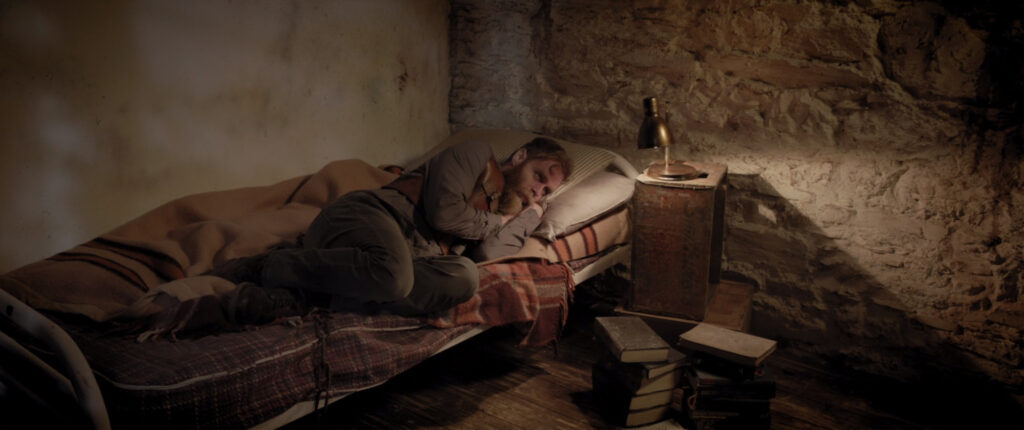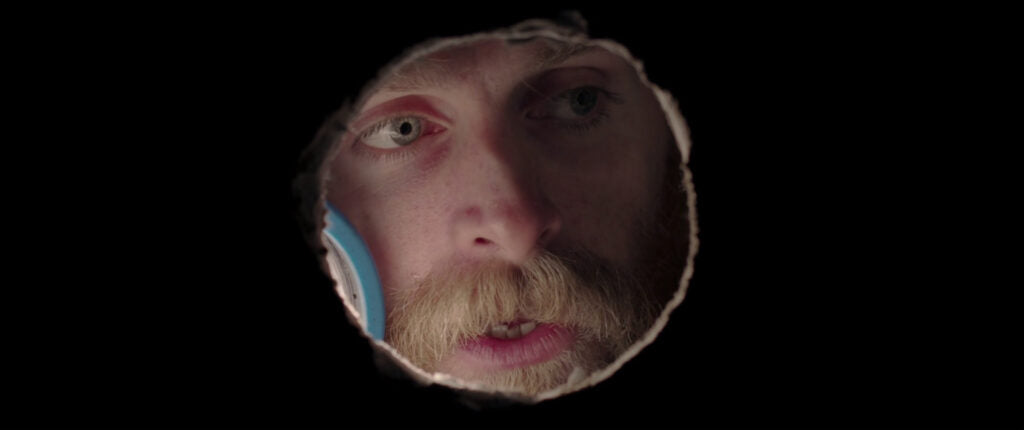Caveat is a standard low-budget horror setup: it has a minimal cast of only three people and takes place almost entirely in a single location - a spooky house of hidden and not-so-hidden horrors where things go bump in the night and strange noises echo through the halls.
But writer and director Damian McCarthy - who also serves as his own editor and production designer - quickly establishes a uniquely forbidding aesthetic and atmosphere all his own.
The thrills are far more psychological than anything that relies on jump scares or gore, the only sources of light come from dim and tattered lamps or small beams of sunlight breaking through into the house, and the entire film has a consistent look of grimy dilapidatedness that’s almost tangible; as if you can feel every bead of sweat or dust or mold.
Caveat is also a puzzle box for the audience to sort out as it gradually reveals things bit by bit, one that smartly refuses to ever tip its hat completely, forever keeping you guessing until the frantic conclusion finally releases all of its pent-up tension.

Courtesy of Shudder
The film follows a slightly disheveled man named Isaac (Jonathan French) who is fresh out of a stint in the hospital. He’s in desperate need of cash, and reluctantly agrees to do a job for his former landlord, Barret (Ben Caplan). The job seems simple enough. Barret has a niece, a young woman named Olga (Leila Sykes), whose father recently passed away. Isaac just has to stay at the house with her for “probably no more than five days”, keeping her company until Barret returns from an errand. Isaac’s stay in the hospital has resulted in him suffering from some partial memory loss, but even he knows that something doesn’t sit quite right here. “There’s got to be more to it than that.”
There is. The first surprise is that Olga’s home is situated on a small island, a fact that Barret failed to disclose. Also, Olga is a little mentally disturbed (her uncle simply explains that she has “psychological problems”) and has a particular fear of men, so Isaac isn’t allowed to go near her or her room. This isn’t too much of an issue (and Olga seemingly spends most of her time in a catatonic state with her hands covering her face anyway) until Barret suddenly brings out a clunky, terrifying harness that he expects Isaac to wear. It’s chained tight to an immovable anchor in the basement, restricting the wearer’s movements to only certain parts of the house.
Anything else? Well, Olga’s father’s death was a suicide and it occured in the home -in the basement to be exact. Viewers will likely ask themselves why anyone would ever agree to do this exceedingly sketchy job, but Isaac’s a good guy, and once he gets his first view of Olga, huddled in a corner and unable to respond to anyone, he feels sympathetic. The harness goes on, Barret leaves on the only available boat, and a twisted game of lies, deceit, preys and predators commences.
There’s an acute and filthy sense of dread permeating throughout the movie, and Isaac’s leash, combined with the sunken look of the home, help create an ever-growing feeling of claustrophobia. There’s truly no escape; even if he was able to get out of the harness and leave the house, he can’t get off the island.

Courtesy of Shudder
The mystery unravels in genuinely unexpected ways, and McCarthy scatters breadcrumbs and small details - like an intercom system, a single phone that’s located in Olga’s room, a hole in the wall of the basement, and others - for viewers to remember as it goes along. The film’s slow reveal of information and the fact that large chunks of it unfold without dialogue, only the anxious breaths of Isaac and small slivers of light illuminating him as he explores the cavernous house, might lose the attention of some, but it does have an intriguing angle that it takes narrative-wise.
Plenty of stories employ the use of an unreliable narrator, but McCarthy ensures that none of the film’s characters can fully be trusted. Isaac is certainly the victim here, but his memory lapses don’t allow for a full picture of his circumstances. Olga may be insane, but she may not be. Once she starts talking, it’s hard to decide. And Barret is untrustworthy from the start. Trying to decide who’s telling the truth and who isn’t keeps everything moving and keeps the audience on their toes, despite the film’s creeping pace. Caveat is a story of violence, guilt, revenge, and the ghosts they all conjure up. It’s both scary and enticing, a nice blend of supernatural and psychological thrills, and a smart piece of art.
‘Caveat’ streams exclusively on Shudder starting June 3rd.




